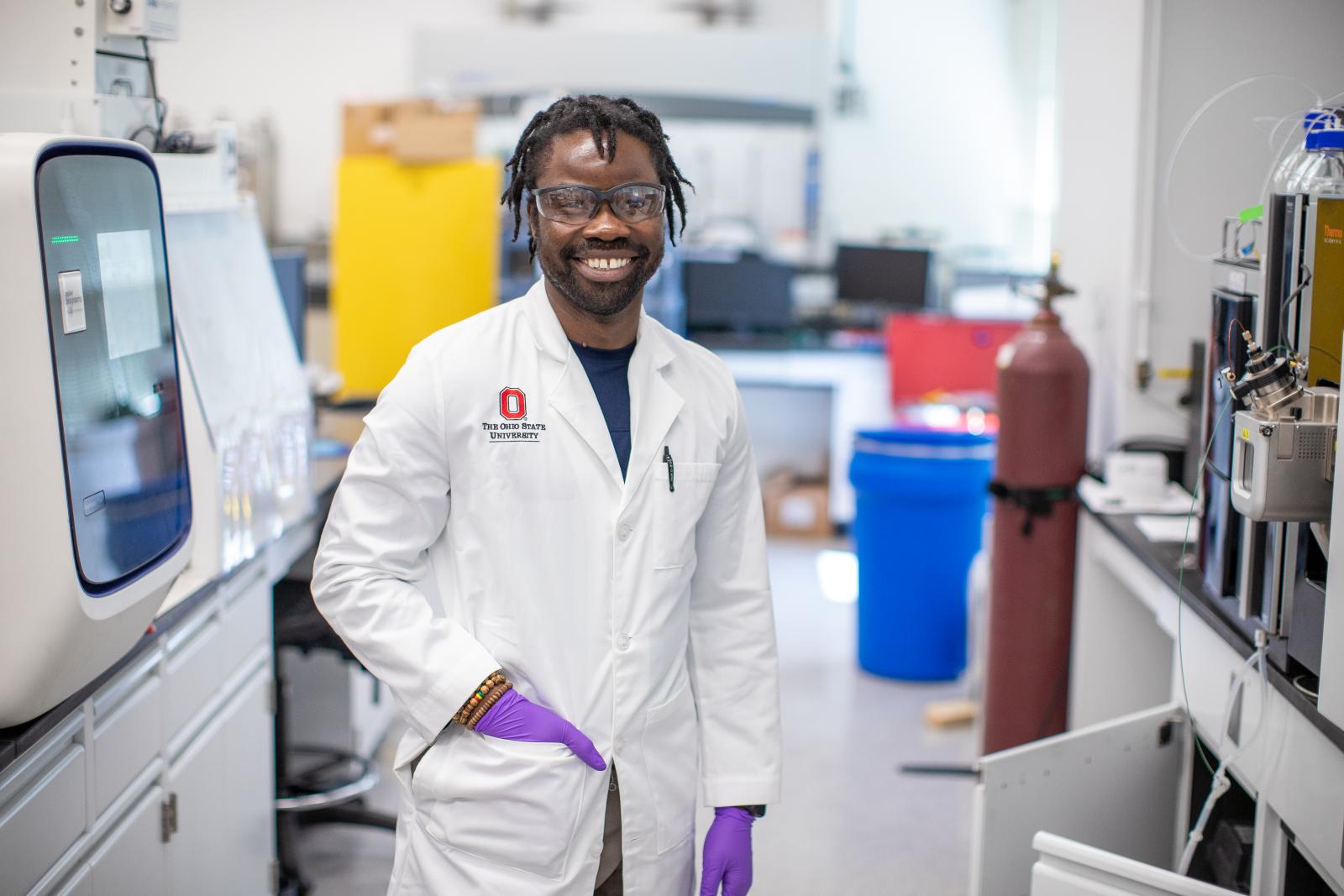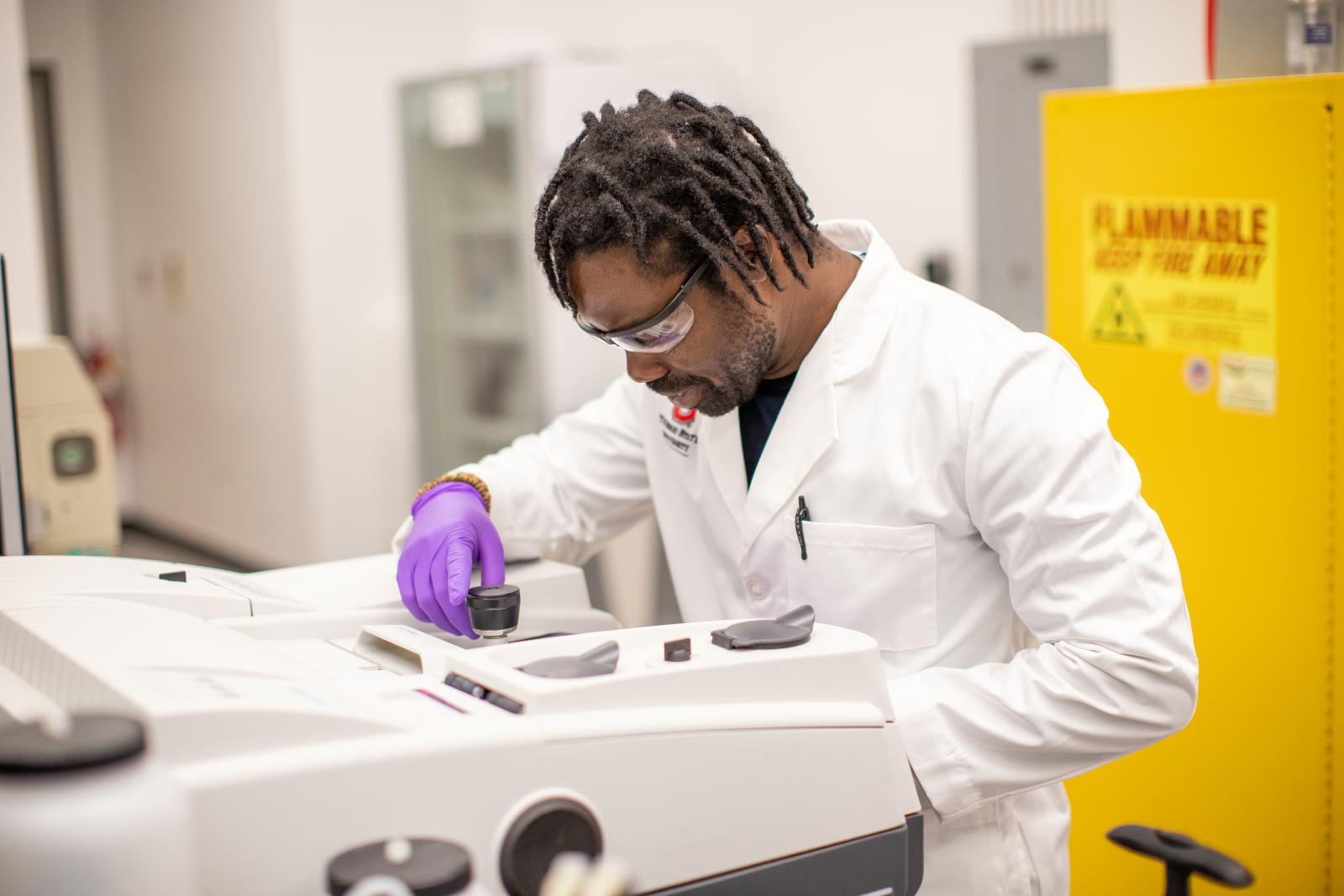Offering more to the next generation of scientists: Daniel Adu-Ampratwum reflects on his mentors

Daniel Adu-Ampratwum, PhD, research assistant professor in the Division of Medicinal Chemistry and Pharmacognosy, has experienced life at the College of Pharmacy from two very different perspectives – student and faculty. Today, Dr. Adu-Ampratwum is conducting ground-breaking research in a shared space with Jim Fuchs, PhD, professor and associate dean of research.
While he currently runs the operations of multiple research projects, aided by the help of undergraduate students, he himself didn’t begin instrumentation work in a lab until his master's program.
A Start in Chemistry
Dr. Adu-Ampratwum's interest in drug development was inspired by his family. Born into a long line of herbalists, he was fascinated by the way his relatives used natural products to treat illness and injury. This served as his motivation to investigate the role of chemistry in medicinal treatments.
While in the undergraduate chemistry program at Kwame Nkrumah University of Science & Technology in Ghana, Dr. Adu-Ampratwum found that there were no established pharmacy schools in the country, and chemistry jobs and labs were sparse.
“During my last year of undergraduate studies, I was lucky to get one of two spots assisting a chemistry PhD student in her lab,” Dr. Adu-Ampratwum recalled. “With that opportunity, I learned about the possibilities of isolating molecules from natural products and breaking them down for research. That exposure was what pushed me to pursue further lab education.”
Dr. Adu-Ampratwum joined a master's program at Indiana University of Pennsylvania (IUP) where he found greater access to lab spaces and a career-changing mentor, Professor Keith Kyler, PhD.
“When I began in Dr. Kyler’s lab, I told him that I wanted to analyze the properties of isolated molecules of natural products,” Dr. Adu-Ampratwum said. “He responded, ‘You know you can be on the other side, right? You can build your own molecules rather than rely on what nature has available.’”
Under Dr. Kyler’s guidance, Dr. Adu-Ampratwum was not only introduced to a myriad of new instrumentation methods, but his perspective on drug development shifted.
Reflecting on how this altered the trajectory of his career and research focus, Dr. Adu-Ampratwum expresses thanks that he’s able to provide his students with a similar level of research exposure.
“I can see a clear difference between how I was trained as an undergraduate,” Dr. Adu-Ampratwum noted. “It’s great that Ohio State students get to start early and figure out if they want to go into research. If I hadn’t been exposed to different labs and perspectives as a student, I wouldn’t be here today.”
Becoming a Mentor in Ohio
In 2010, Dr. Adu-Ampratwum accepted a position as a PhD candidate with The Ohio State University Department of Chemistry. His acceptance was influenced by the university's research offerings and the great food in Columbus.
“If I’m being honest, when I visited the city, I saw a lot of Ghanian shops and knew that I would have access to good food if I came to school here,” Dr. Adu-Ampratwum said with a laugh.
Under the direction of his PhD advisor, Professor Craig Forsyth, PhD, Dr. Adu-Ampratwum became a skilled synthetic chemist and was able to match with the Fuchs Lab for a position as a postdoctoral researcher.
Dr. Fuchs and his collaborator Mamuka Kvaratskhelia, PhD, professor of the Department of Biology, were in search of a skilled post-doctoral researcher to support their work on HIV treatment. Dr. Adu-Ampratwum initially struggled to reconcile his habits as a chemist with those of Dr. Kvaratskhelia, a biologist.
“According to Mamuka, the time I took to make one molecule [five years] was not a good thing in the eyes of a biologist,” Dr. Adu-Ampratwum said. “But Dr. Fuchs understood why my timelines looked the way they did. As I started to work with the two of them, we had an interesting dynamic with the combination of biology and chemistry perspectives.”

Under the guidance of Drs. Fuchs and Kvaratskhelia, Dr. Adu-Ampratwum found himself enthralled in his work. These lab mentors granted him independence and access to advanced resources, allowing him to make exciting discoveries in HIV research.
“When you’re a part of a strong lab team like this, you find yourself with new ideas that you want to finish exploring,” Dr. Adu-Ampratwum said. “If you leave that team in the middle of a project, you don’t know that it will be completed. I knew I had to continue with Dr. Fuchs’ Lab.”
Since the start of his post-doctoral position in the Fuchs Lab, Dr. Adu-Ampratwum has advanced to the role of research scientist and now to research assistant professor.
Though he manages his own team of student researchers and independent projects, he still shares a lab space with Dr. Fuchs. This guarantees that Dr. Adu-Ampratwum can continue researching with the caliber of equipment he’s been using in the Fuchs Lab for the past six years.
“It’s also special to let my undergraduate researchers interact with the high-level equipment in the Fuchs Lab,” Dr. Adu-Ampratwum said. “I’m hoping that I’ll offer them exposure to lab technique that I didn’t use until my later degree programs.”
In the future, he’ll expect to move locations, but with the difficulty of funding and establishing laboratory spaces, he’s happy to spend a bit more time with his mentor.
“I only became a research assistant professor in January,” Dr. Adu-Ampratwum exclaimed. “I still come to Dr. Fuchs for questions about budgeting or how to manage student researchers. We’re just changing our dynamic a bit more. We still collaborate and brainstorm.”
Dr. Adu-Ampratwum is excited for more independence as he steps into the role of instructor but is grateful to have established mentors backing him up.
Ohio State provides the resources for anyone to explore their field of interest, and there are always Buckeyes around to help make it a positive experience. Dr. Adu-Ampratwum counts himself lucky to have joined that community of Buckeyes where he can grow for years to come.